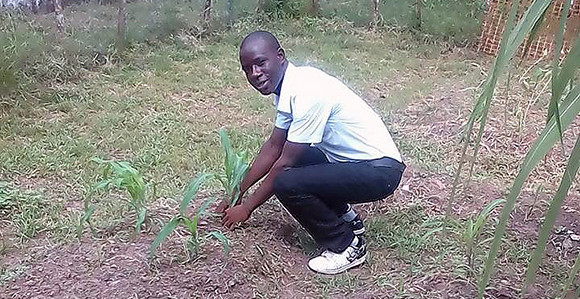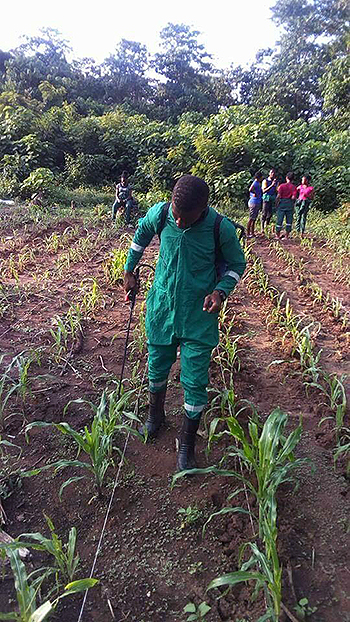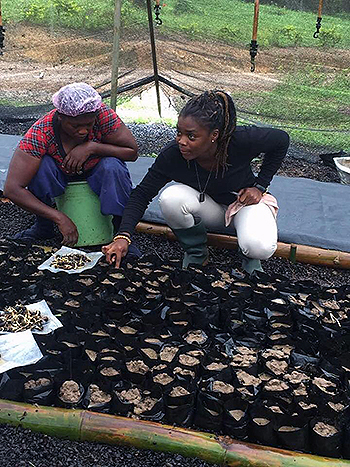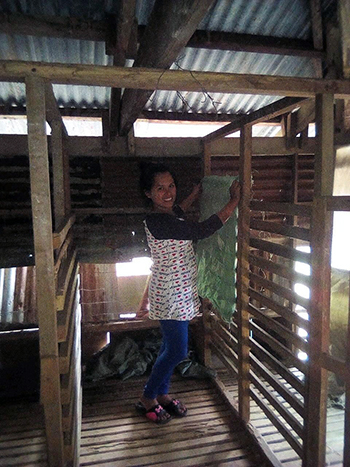Nearly 100 LDS Students Get Scholarship to Study Agriculture, Fight Poverty
Contributed By Hannah DeTavis, ChurchofJesusChrist.org Church News staff writer

A student working at his school’s practical garden site. With the Ezra Taft Benson Agriculture and Food Scholarship, young Latter-day Saints around the world are tackling issues of poverty and food security in their countries.
Article Highlights
- Latter-day Saints in developing countries are combatting hunger through agricultural studies.
- The Ezra Taft Benson Agriculture and Food Scholarship funded nearly 100 students’ studies in 2017.
“To most people, agriculture is hard, hot, and backbreaking, but these young Latter-day Saints look at the land and see potential.” —Brett Macdonald, Benson Scholarship administrator
Related Links
With the help of the Benson Scholarship, more young Latter-day Saints are addressing poverty and food security in their home countries than ever before.
The Ezra Taft Benson Agriculture and Food Scholarship provides financial aid for Church members seeking higher education in agricultural studies and related fields. In 2017, the Benson Scholarship program planned to allot scholarships to 15 students. Amazingly, the program granted nearly 100 scholarships, making it a banner year for the fund.
When Abraham Lincoln Jarwee from Liberia found out about the Ezra Taft Benson Agriculture and Food Scholarship, he quickly applied—hoping that an agricultural education would help him feed his country.
Their efforts are made possible, in part, because of the Benson Scholarship.
As a beneficiary of the Benson Scholarship, Jarwee is able to attend Stella Maris Polytechnic to study general agriculture.
“This is such a glorious opportunity that many Liberians yearn for. I am a fortunate young man to have been a part of this program,” Jarwee expressed. “The Lord knows why I was chosen.”
Jarwee intends to use his agricultural education to feed his family and his community, whether that be through self-farming or farming through governmental or private entities.
“In Liberia, agriculture has suffered as a result of the 2014 Ebola outbreak and prolonged civil crises,” Jarwee said. He explained that the lack of agricultural professionals, among other factors, contributes to food scarcity in Liberia.
“Liberia needs professional agriculturalists to help improve … the economic development of our country. And as that begins to happen, the Church will also begin to flourish in every part of the country,” he explained.
For many Benson scholars, the road to an education isn’t easy, even after they receive funding. When Grace Oke from Nigeria first enrolled in school to study crop production and soil science, her professors went on strike for months at a time, hindering her academic progress.
“I learned that everything happens for a reason—even the strike,” she said. “Because I knew it was in Heavenly Father’s plan, I had the courage to keep going, and I eventually changed schools.”

A student harvesting a fresh fruit bunch. Photo courtesy of Eugene B.

A student prepares land for her crop science class. Photo courtesy of Jenelyn G.

“Agriculture has the power to fight out poverty.” —Nwobodo V. Photo courtesy of Nwobodo V.
Another Benson scholar from the Philippines, Maurisse Rabanes, discovered that her father passed away suddenly during her third year at Visayas State University. Even though her university is far from home on another island, Rabanes bravely persists in her studies in the wake of her loss.
“It’s been hard because I miss my dad a lot, and it can be hard to focus sometimes,” she said. “Right now, I’m studying as hard as I can, because I know that all challenges are there to make us stronger.”

Students at an internship training learning how palm oil is processed into crude palm oil and palm kernel oil. Photo courtesy of Eugene B.
Despite the personal and national trials they experience, tenacious students like Jarwee, Oke, and Rabanes make the scholarship initiative a success, one crop at a time.
Funding for international food security

A student preparing housing for poultry. Photo courtesy of Jenelyn G.
Food security is one of the basic building blocks of a country’s development and graduation out of poverty, said Brett Macdonald, administrator of the Ezra Taft Benson Agriculture and Food Scholarship.
“There are bright, capable, committed Latter-day Saints [in places] you might not expect … rising to the challenge of feeding their people. To improve the lives of people living in extreme poverty, one of the most effective things to do is to enable them to go from eating one meal a day to eating two meals a day. These Benson scholars are learning how to make that happen,” he explained. “And they’re doing it optimistically.”

A student rearing catfish in plastic tanks. Photo courtesy of Adeniji C.
Oke said that she feels agriculture is the key to helping her country prosper. When she was accepted for the Benson Scholarship, she described her reaction: “I was overwhelmed. … I thought, ‘Wow, this is really God’s plan.’ He’s not going to allow us to suffer forever.”
The Philippines is rich in natural resources, Rabanes explained, but those resources are not properly cultivated for adequate food security. “Our farmers here are very poor, and they have a hard time switching from old agricultural practices to new ones,” she said.
She described how she plans to use her horticultural studies to fight poverty: “Agriculture is the mother of all other industries. By studying hard now, I can learn to use my resources, produce plenty of food, start a business, hire people, and eventually lessen the effects of poverty in my community.”
About the scholarship
Successful applicants of the Benson Scholarship live in a developing country and plan to use their education to work in their homeland.
Macdonald described the attitude of scholarship applicants: “These are people who are saying, ‘I can’t bear to watch my people go hungry. I want to help develop the resources we have, like land, and find people willing to work it. I want to help my family, my community, and my country to use these resources to feed itself and generate income.’”
The scholarship was named after President Ezra Taft Benson, who used his expertise in agriculture to help others around the world—both as an Apostle of the Lord and as the United States Secretary of Agriculture.
“That same spirit that Ezra Taft Benson had of responding to crisis situations and figuring out how to help those in need is the spirit that many of these young people have,” Macdonald remarked.
Students use the scholarship to study a wide range of agricultural disciplines, including agribusiness management, agriculture engineering, agriculture technology, agronomy, horticulture, animal science, nutrition, entomology, and range and pasture management.
Many students see their studies as an opportunity to grow spiritually as well as educationally.
“There’s a Primary song that says, ‘Faith is like a little seed: If planted, it will grow,’ Rabanes recalled. “Just like I have to take care of a little seed to make it grow into a big plant, I also have to take care of my faith,” she said. “I have to pray every single day, read the scriptures, and help everyone I can. It makes my faith grow, just like the plants I’m learning about.”
Networking through an online community
Upon acceptance to the scholarship program, students are invited to join a large online community of other Benson scholars. On the Ezra Taft Benson Agriculture and Food Scholarship Facebook page, LDS students from around the world share project stories, ask questions, lend support, and bolster each other’s faith.
The Facebook group’s administrator also invites field experts to post from time to time. Students can consult with these professionals about questions they have and projects they are working on.
Macdonald explained that the Facebook page connects students in Africa, Asia, Central America, and South America who are interested in beating hunger in their countries.
“One thing that I really enjoy about the Benson Scholarship Facebook page is that it gives me feedback and inspiring experiences from other Benson scholars around the world,” Jarwee said.
According to Macdonald, the Philippines is seeing an exodus of young people choosing agriculture as a career because it seems like a step into the past instead of a step into a technology-driven future. “And yet, here you have a dozen or more Latter-day Saints in the Philippines who are rushing into the problem instead of away from it,” he said.
Jarwee said, “One of the posts that really touched me was from a brother … from the Philippines. He expressed gratitude for the opportunities that the Benson Scholarship has given to him that he may not have gotten [otherwise].”
Rabanes, studying in the Philippines, said, “The Benson Scholarship is a beautiful opportunity, because there are so many students struggling financially in the Philippines.”
She added, “On the Facebook page, I like to see how agriculture is done in other countries. I can learn from what they’re doing to help my community.”
Because the Ezra Taft Benson Agriculture and Food Scholarship far exceeded its goal for 2017, administrators are setting their sights high for 2018. “This year, we hope to fund about 125 scholarships,” said Macdonald.
Administrators plan to identify more approved schools and expand the program into several new areas based on agricultural interest in the area.
“To most people, agriculture is hard, hot, and backbreaking, but these young Latter-day Saints look at the land and see potential,” he said.
